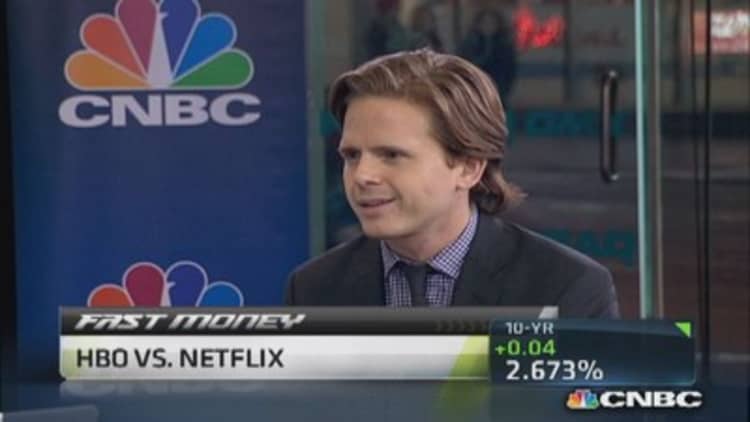
Netflix investors now know what a real blockbuster looks like: HBO. On Wednesday, for the first time, HBO parent Time Warner disclosed detailed financials for the premium cable network.
Analysts say it has held fairly steady in recent years, at about 28 million domestic subscribers, but revenue was up 4 percent last year, to $4.9 billion, while operating income rose 8 percent, to $1.7 billion.
That performance shows just how far Netflix has to go, despite its high-flying share price. Though the on-demand streaming service eclipsed HBO with 33 million domestic subscribers at the end of last year, it had just $228 million in operating income on revenue of $4.4 billion. Meanwhile, free cash flow was negative $16 million.
(Read more: HBO, movies boost Time Warner revenue )
What separates HBO from its younger rival is pricing power. Even without relying heavily on subscriber growth in the U.S., the network's subscription revenue rose 6 percent in 2013 and 8 percent in the fourth quarter. Time Warner said it expects continued fee increases in the mid-single digits, independent of any subscriber increases.
Netflix has stuck largely to a pricing model of a $7.99 flat rate per month, with an $11.99 option for a relatively small number of customers who want to stream on four screens at once. That has probably been a prudent move, given the backlash when it raised prices in 2011.
(Read more: Michael Kors rally won't set a retail trend)
The most likely way for Netflix to raise prices is to offer more of its own original programming. The audience and critical hits "House of Cards" and "Orange Is the New Black" are a step in that direction.
A couple of years ago, Netflix was losing about half of its domestic subscribers every year, but that churn has probably slowed to about 35 percent to 40 percent, estimated Tony Wible of Janney Montgomery Scott.
Unfortunately for Netflix, it could require a much bigger investment in original programming before it has enough loyalty to raise prices significantly.
HBO adds about 200 hours of original content every year, including hit series such as "Game of Thrones," "Boardwalk Empire" and "Girls," along with sports and documentaries. That's on top of the movies it gets soon after theatrical release from Warner Bros., Fox, and Universal Pictures, which is owned by CNBC parent NBCUniversal, a unit of Comcast.
Michael Nathanson of MoffettNathanson estimates that HBO has a cash budget of more than $1 billion a year for original material.

(Read more: Missed the Twitter surge? Meet its Chinese cousin)
Netflix is already spending heavily on content, with $7.3 billion in future obligations as of the end of 2013. Less than 10 percent of the content budget goes to originals, however, suggesting there's a need to ramp up spending further. That may explain why the company just borrowed $400 million through bonds with a 5.75 percent coupon.
Such an investment has no guarantee of a payoff, either. While Netflix has had some early success, others have shown how tough it is to land an enduring hit.
Starz, whose CEO Chris Albrecht had great success developing original series for HBO, is still waiting for a breakthrough series.
Netflix has a market capitalization of $24 billion, about 96 times forward earnings per share. With Time Warner as a whole worth only $56 billion, Netflix investors will need some luck for the stock's run to continue.
—By CNBC's John Jannarone; follow him on Twitter @jannarone.

